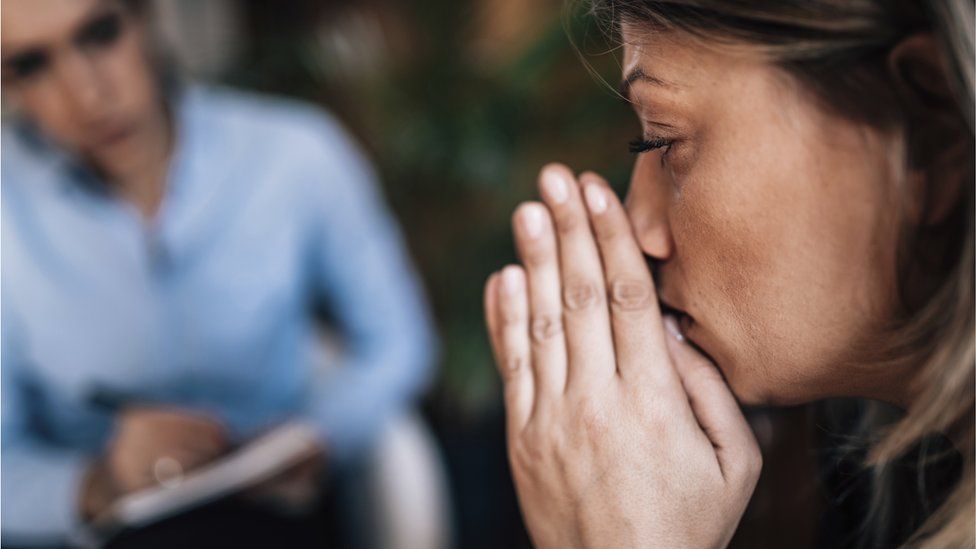Coronavirus: What is anxiety and how can I get help?
- Published

Anxiety is one of the most common mental health problems experienced in the UK.
Dramatic changes in all our lives during the past six months have increased anxiety levels, and a new study suggests parents are particularly worried about the wellbeing of their children.
So what does anxiety feel like and how do you overcome it?
What is anxiety?
It's more than just feeling stressed or worried. These are natural reactions we all feel at some stage, and they can be a good thing.
But constant anxiety feels like fear which doesn't go away, and if it becomes too intense it can take over your life and stop you doing normal everyday things.
Anxiety makes you feel worried all the time, tired and unable to concentrate. This can cause sleeping problems and leave you feeling depressed.
There are often symptoms which affect the body too, such as a fast heartbeat or breathing, trembling, sweating, dizziness, diarrhoea and feeling sick.
Anxiety can come in different forms and range from being mild to severe.
Up to one in 10 people will have a problem with anxiety or phobias at some point in their lives - but many don't ask for treatment.
Where do I go for help?
The Royal College of Psychiatrists suggests trying self-help techniques first, like:
- talking to a friend or relative
- joining self-help or online support groups
- learning relaxation techniques
Activities such as yoga, exercise, reading and listening to music can also help.
Experts say it's a good idea to cut down on alcohol and stop smoking to reduce anxiety.
If your anxiety persists, there are lots of self-help books on the best therapies, such as cognitive behavioural therapy (CBT), which is also provided on the NHS.
CBT is a talking therapy which helps people deal with overwhelming problems by breaking them down into smaller chunks.
It is suitable for children with severe anxiety too, and parents can be taught how to do it.
"It's important not to suffer in silence," says Nicky Lidbetter, from Anxiety UK.
She recommends booking an appointment with a GP and explaining your symptoms, but she says "one path doesn't suit everybody".
Are children and young people affected too?
"Some are struggling, some are thriving because of a lack of pressure from school," says Prof Cathy Creswell, professor of developmental clinical psychology at University of Oxford.
Her survey of children and parents during the first month of lockdown found an increase in feelings of unhappiness, anxiety and low mood among primary school children taking part.
But parents of secondary age children reported fewer emotional problems, and teenagers themselves said their mood and behaviour hadn't changed.
This is reflected in another survey of 13 to 14-year-olds, which found they were less anxious during lockdown than they had been last October, suggesting there is huge variation among children of different ages.
- Be there to listen: Ask them how they are regularly, so they get used to speaking about their feelings
- Stay involved in their life: Show interest in it and the things that are important to them
- Support positive routines: Be a positive role model and support regular bedtime routines, healthy eating and getting active
- Encourage their interests: Being active, creative, learning things and being a part of a team are all good for mental health
- Take what they say seriously: Help them feel valued in what they say, and help them work through difficult emotions
What are the triggers?
Anything from worries about health and money to changes at work, school or relationships can cause deep-seated anxiety.
During the pandemic, there have been many potential anxiety triggers such as fears over the virus, going outdoors, infecting other people, wearing masks and returning to normal life, as well as what the future holds.
These have been termed coronanxiety by charity Anxiety UK, which has received a huge rise in calls to its helpline since lockdown rules were relaxed.
Callers tend to have more complex problems than normal and calls are lasting longer, the charity says.
Psychiatrists are warning that lockdown and social distancing is affecting people's routines and stopping them seeing friends and family. This can make any anxiety they are feeling even worse.
There are also concerns that people aren't seeking help for their mental health because of fears over the virus, and this is leading to an rise in emergency cases.
"If you feel unwell you can still get treatment during the pandemic," says Dr Billy Boland, from the Royal College of Psychiatrists.
"If you are facing mental health issues contact your GP or key worker, if you have one, and continue to use your mental health services as usual. If you are in a mental health crisis contact the NHS 111 online or telephone service."
Who is most at risk?
Anxiety is a common condition and, at the moment, many people are feeling anxious about life.
The things that have happened in your life, any big changes or traumatic events, can make you prone to anxiety.
Having a mental health problem can make you feel more anxious, as can having another illness, but how anxious you feel could also be down to the genes you inherit too.
Teenagers and young people often feel anxious, and those with special educational needs or from low income families are usually most vulnerable.
But experts say it's still too early to work out the long-term effects of time spent out of the classroom.
"It is critical to keep an eye on how children will cope with changed routines at school and uncertainty," says Prof Creswell.
Related Topics
- Published26 March 2020